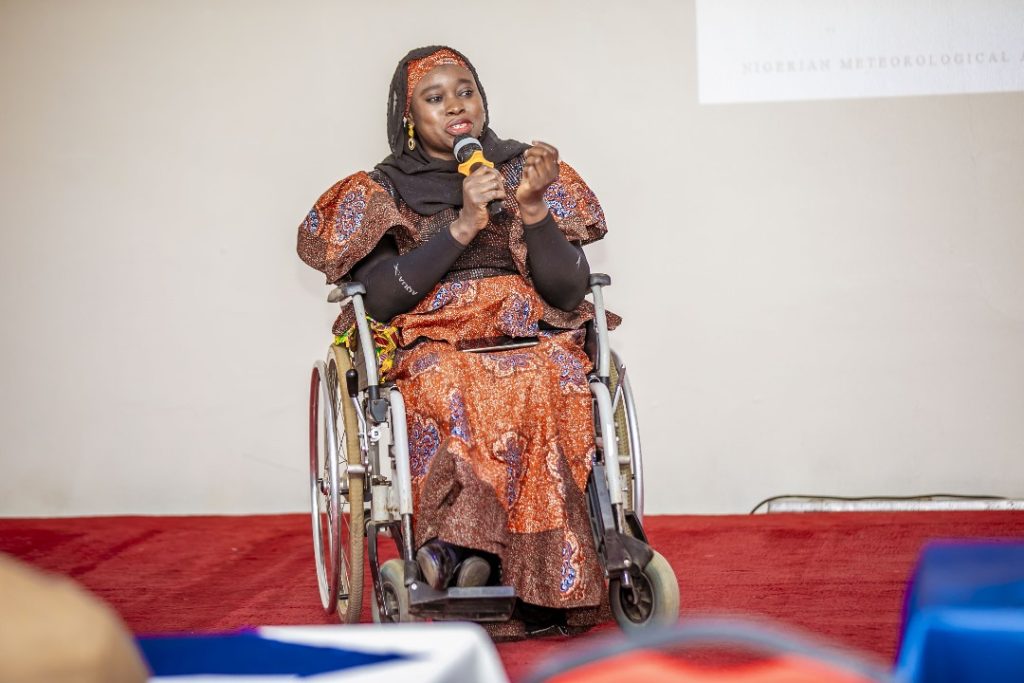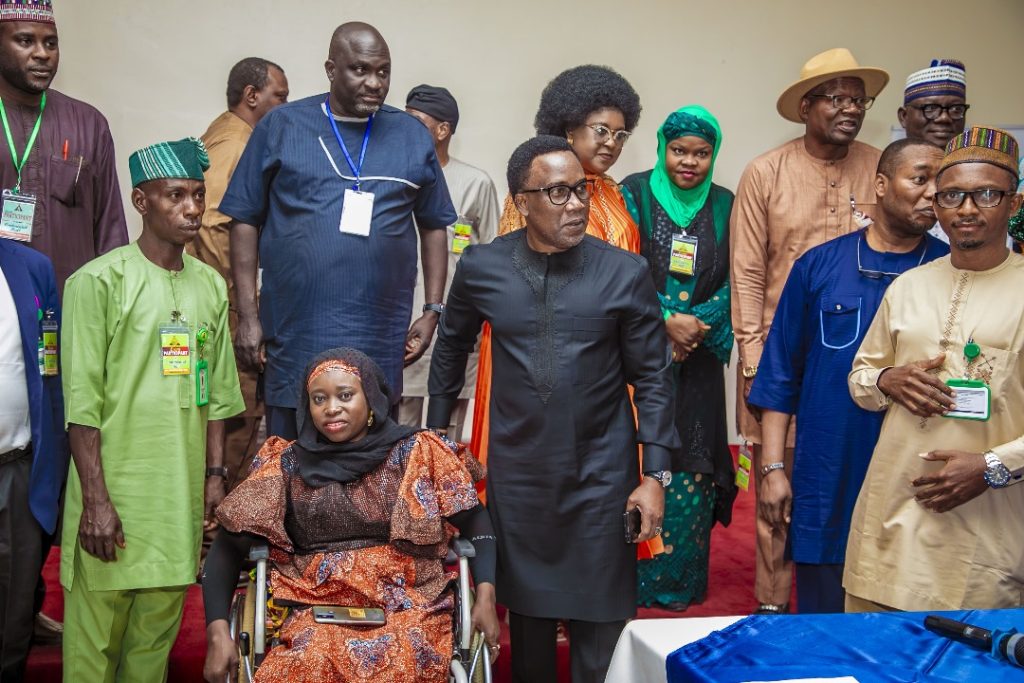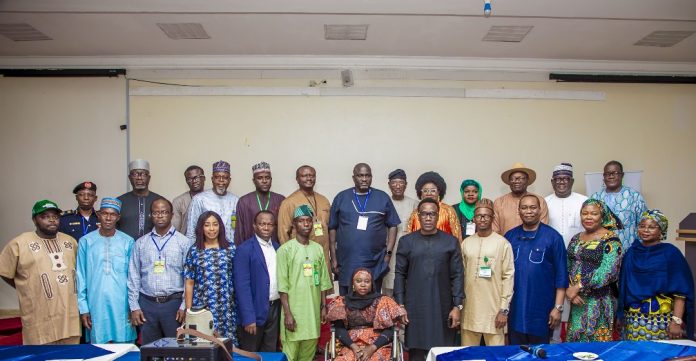In an effort to ensure that no one is left behind in the fight against climate change, the Advocacy for Women with Disabilities Initiative (AWWDI) actively participated in the 2025 Seasonal Climate Prediction Stakeholders Workshop organized by the Nigerian Meteorological Agency (NiMet). The workshop, held under the leadership of Director General, Prof. Charles Anozike, brought together diverse stakeholders to craft strategies for mitigating the impacts of climate change.
AWWDI’s participation was marked by a powerful presentation on Inclusive Disaster Risk Reduction Strategies, spotlighting the urgent need for disability-inclusive planning. The organization emphasized that climate change affects everyone, but persons with disabilities (PWDs) face disproportionate risks due to systemic barriers and a lack of inclusive disaster response frameworks.
The Disproportionate Impact of Climate Change on Persons with Disabilities
Climate disasters such as floods, storms, heatwaves, and droughts wreak havoc on communities, but for PWDs, these events pose unique challenges that often go unnoticed in mainstream planning. AWWDI’s presentation underscored the importance of understanding how climate change affects different clusters of disabilities and tailoring solutions to their needs.
Challenges Faced by PWDs in Climate Disasters
- Persons Who Are Blind or Visually Impaired
During floods or storms, familiar landmarks and routes often become unrecognizable, leaving blind individuals unable to navigate safely. For example, heavy rains that wash away paths or fill roads with potholes significantly increase the risk of injury. Emergency communications, which often rely on visual signals or text, further exclude blind persons from critical warnings and instructions. - Persons Using Wheelchairs, Crutches, or Mobility Aids
Flooded roads, muddy terrain, and debris make movement nearly impossible for individuals relying on wheelchairs or crutches. In flood-prone areas like Bayelsa and Lokoja, accessing safe zones or evacuation shelters becomes an insurmountable challenge. Moreover, shelters are often inaccessible, lacking ramps, elevators, or suitable restrooms. - Persons Who Are Deaf or Hard of Hearing
Emergency responses during disasters typically rely on sirens, verbal announcements, or radio broadcasts—methods that do not cater to the deaf community. For instance, during emergencies in rural areas, evacuation orders are rarely communicated in sign language or accessible formats, leaving deaf individuals unaware of life-saving instructions. The absence of trained responders who can effectively communicate with the deaf community exacerbates delays in rescue efforts. - Persons with Albinism
Climate change has intensified exposure to ultraviolet rays, posing significant health risks for persons with albinism, including severe sunburn and increased chances of skin cancer. In drought-affected regions, limited access to shaded areas or protective measures like sunscreen leaves this group especially vulnerable. - Persons with Intellectual or Psychosocial Disabilities
Climate disasters often trigger abrupt changes and displacement, causing severe distress and disorientation for individuals with intellectual or psychosocial disabilities. Emergency response systems frequently neglect their needs, failing to provide clear instructions, calming environments, or caregiver support, further isolating them during crises.
AWWDI Advocates for Inclusive Climate Solutions
During the workshop, AWWDI made a compelling case for the inclusion of PWDs in disaster preparedness and climate prediction strategies. Recognizing that PWDs bring invaluable lived experiences to the table, the organization urged stakeholders to prioritize accessibility and inclusivity in all climate action plans.
AWWDI highlighted several key measures to ensure no one is left behind:
- Accessible Early Warning Systems: Early warning signals must be disseminated in multiple formats, including braille, sign language, and audio announcements. This ensures that PWDs, regardless of their disability type, receive timely and accurate information.
- Inclusive Evacuation Shelters: Shelters must be equipped with ramps, accessible toilets, and accommodations for individuals with mobility, sensory, or psychosocial disabilities.
- Community Awareness and Training: Emergency responders and community members need to be trained on how to effectively support PWDs during disasters, including communication techniques for deaf individuals and psychosocial support strategies.
The Role of NiMet and Disability-Inclusive Climate Predictions
The Nigerian Meteorological Agency (NiMet) is at the forefront of providing critical seasonal climate predictions to guide national and community-level disaster preparedness. However, AWWDI stressed the importance of integrating disability data into these predictions. Prof. Anozike, NiMet’s Director General, acknowledged the value of such inclusion and commended AWWDI for its advocacy, stating, “Climate change is a shared challenge, and our strategies must reflect the realities of all citizens, including persons with disabilities.”

AWWDI’s Commitment to Inclusive Climate Action
With support from the Disability Rights Fund, AWWDI is committed to driving disability-inclusive climate policies and actions in Nigeria. The organization plans to work closely with NiMet and other stakeholders to ensure that disability considerations are embedded in all climate prediction and disaster response strategies.
As part of its advocacy, AWWDI will continue to raise awareness about the unique vulnerabilities of PWDs in the face of climate change. By championing inclusive solutions, the organization aims to build resilience and ensure that PWDs are not left behind in the fight against a rapidly changing climate.
A Call to Action
AWWDI’s participation in the NiMet workshop was a rallying cry for inclusive climate action. As climate disasters become more frequent and severe, it is imperative that all stakeholders recognize and address the disproportionate risks faced by PWDs. The message is clear: inclusive strategies are not optional—they are essential for building a resilient, equitable future for all.
Through its advocacy and collaboration with organizations like NiMet, AWWDI is paving the way for a more inclusive Nigeria, one where every voice is heard, and every life is valued in the face of climate challenges.




